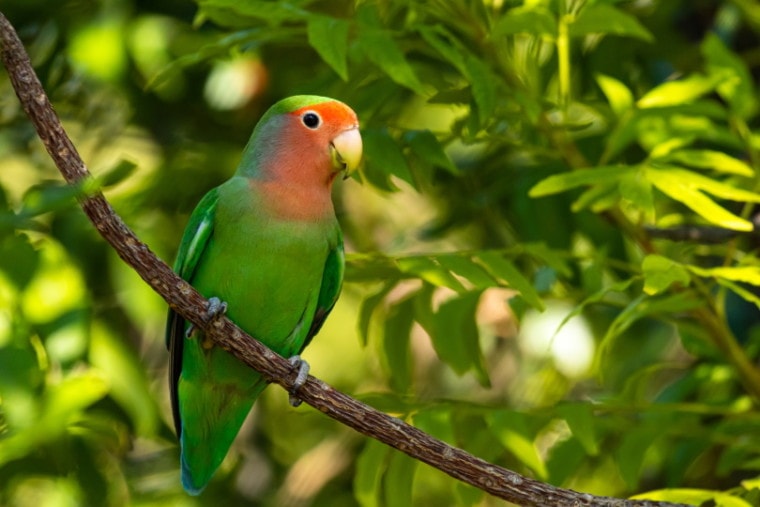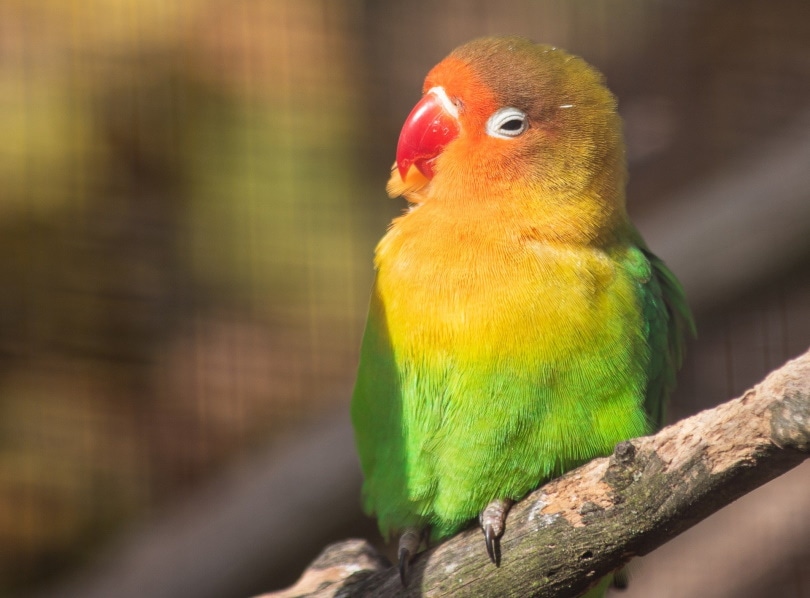
Lovebirds are popular pets often kept in pairs because they tend to mate for life and are fun to watch, cuddle and carry on. However, it’s also possible to keep a single lovebird. You just need to give it more attention. Many inexperienced owners worry that their new bird isn’t happy or doesn’t like them, especially if it seems to be acting strangely. If you are interested in learning more about our pet, keep reading while we list the signs and behaviors your bids will exhibit if it likes you. We’ll also discuss how to tell if your pet is too bonded to you and if your bird will bond with someone else.
 The 9 Signs Your Lovebird Likes You
The 9 Signs Your Lovebird Likes You
1. Your Bird Gets Excited When You Walk Into the Room
One of the best and easiest ways to tell if your lovebird likes you is to pay attention to how It reacts when you walk into the room. If it gets excited and starts hopping to different perches and creating a lot of chatter and whistles, it’s glad that you are there. Birds will only get excited to see someone it likes.
2. Your Bird Does Tricks When You Are Around
If your bird likes you, there is a good chance it will do a lot of showing off, not just when you enter the room but the entire time you’re there. Your lovebird will play more dramatically with its toys and may take on the role of an acrobat, swinging upside down and quickly moving from perch to perch. It will also likely fluff out its feathers a little to make it look more colorful.

3. Your Lovebird Is Eating
Your lovebird will not eat when there is even the slightest risk of danger since doing so in the wild would expose it and slow its escape. If it’s eating while you are nearby, there is little doubt it likes you and feels comfortable with your presence.
4. Your Lovebird Wants to Be Near You
If you let your birds out of the cage and the lovebird tends to stand by you, there is a good chance it enjoys your company. You might even notice it climbing on you frequently. If your lovebird wants to stay near you instead of exploring the room, it likes you.

5. They Mirror Your Behavior
Your lovebird may not learn words or copy sounds that it hears, but it does watch the behavior of people it likes. When this happens, you might notice your bird napping when you nap and eating when you eat. It might even sing and dance while you are listening to music. If you see your bird copying your behavior, there is a good chance it likes you.
6. Your Bird Wants to Be Pet
Not all lovebirds like to be pet, but most do. As they replace their feathers, their skin becomes itchy, and you might notice your pet rubbing its head and other parts of the boy on twigs and anything else it can find. If it likes you, it will seek out your assistance. If you notice your bird fluffing its feathers and lowering its head toward you, gently scratch it, and your bird will love it. It will even tilt and turn its head so you can get the right spot. This action makes the bird extremely vulnerable, so it will only do it with someone it likes.

7. Your Lovebird Is Preening You
If your lovebird likes you, it may start to preen you and will gently peck at you and rub its beak to clean and straighten your feathers. This preening is a sure sign that your bird has bonded with you and considers you one of the family.
8. Your Bird Is Feeding Your Finger
Many lovebirds will attempt to feed the finger of owners it likes. This behavior is more common in males, and the bird will put food on your fingertip the same way it would feed a baby bird. If you notice your bird doing this, don’t try to discourage it; your bird is letting you know it thinks you are part of its family.

9. Your Lovebird Is Preening Its Feet While Sitting on You
If you have your lovebird on your lap and it begins preening its feet, there is no doubt your bird likes you. It can hardly be in a more vulnerable position while it’s picking at its feet, so if it’s doing it on your lap, it’s not only comfortable with you, it feels protected from all other dangers as well, so it’s a pretty bold stamen that’s easy to miss.
- You may also want to read about: Red-Headed Lovebird
 Can Your Bird Be Too Bonded to You?
Can Your Bird Be Too Bonded to You?
Unfortunately, your lovebird can become too bonded with you and is more common to single bird owners. Since the lovebird doesn’t have a mate, it tends to form a strong bond with its owner. However, if it becomes too bonded, it can become aggressive toward other birds you have and other people who may attempt to interact with it. The best way to prevent over-bonding is to make sure you socialize it with other birds and people as often as possible, especially when it is still young. Your bird will still form a stronger bond with you but will be less likely to become protective and aggressive.
Can Your Bird Bond With Someone Else?
Sometimes a lovebird can become depressed and refuse to eat for a few days with a new owner; but yes, in most cases, your bird can bond with someone new if it found itself with new owners, though it can take some time. Lovebirds have a long lifespan that can often exceed 20 years. Many things can happen in that time that can force you to rehome the bird. If that happens, your lovebird will usually start bonding with a new owner in a few weeks and should not suffer any significant health problems.
 Summary
Summary
As you can see, there are plenty of ways to know if your lovebird enjoys the life you are providing it. If you have a pair of them, you will not usually see as many of these signs because the birds will often be too busy with each other, but a single bird will need continuous interaction. It’s not hard to make your bird like you as long as you spend enough time with it, allow it to spend plenty of time outside the cage, and give it food that it likes. As you spend time with your pet, you will see everything we’ve listed here as well as some unique to your bird.
We hope you have enjoyed our look into the behavior of these amazing birds and have learned something new about them. If we have helped you understand your pet better, please share these nine signs that your lovebird likes you on Facebook and Twitter.
You may also be interested in:
- Pied Lovebird
- Yellow-Collared (Masked) Lovebird: Personality, Pictures, Food & Care Guide
- 14 Signs That Your Pet Bird Trusts and Likes You
Featured Image Credit: Jearu, Shutterstock
 The 9 Signs Your Lovebird Likes You
The 9 Signs Your Lovebird Likes You Can Your Bird Be Too Bonded to You?
Can Your Bird Be Too Bonded to You?





